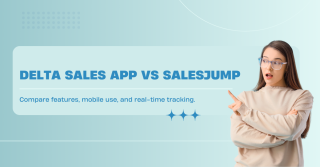How B2B Sales Automation is Setting the Stage for the Future of Sales?
_1738837589.png)
Selling today is a dynamic landscape, where traditional methods are increasingly giving way to innovative strategies. B2B sales automation is at the forefront of this transformation, reshaping how businesses interact and close deals. Imagine streamlining your sales process while enhancing productivity and nurturing leads effortlessly. As technology evolves, embracing these automation strategies isn't just an option; it's essential for staying competitive. Let’s dive into the future of selling and explore how you can harness B2B sales automation to elevate your business success.
Future of Selling: Embracing B2B Sales Automation Strategies
The future of selling lies in the seamless integration of B2B sales automation. This shift allows companies to optimize their processes, enabling teams to focus on building relationships rather than getting bogged down by repetitive tasks.
With advanced tools at their disposal, businesses can streamline lead generation and enhance communication with potential clients. As automation becomes more sophisticated, it paves the way for data-driven decisions that boost efficiency and drive growth like never before.
Best Sales Automation Software Available Now
Sales automation software has evolved significantly, offering a range of tools to enhance efficiency. Popular options like Delta Sales App, Salesforce, and Pipedrive stand out for their robust features and user-friendly interfaces.
Choosing the right one can streamline your processes and boost overall productivity in your sales team.
How to Choose the Right Sales Automation Software?
Choosing the right sales automation software requires a clear understanding of your business needs. Start by evaluating your current processes and identifying areas for improvement. Consider features that support lead generation, communication, and reporting.
Next, assess usability and integration capabilities with existing tools like CRM systems. Look for software with scalability to grow alongside your organization. Seek user reviews or request demos to ensure it aligns with your team’s workflow and enhances productivity effectively.
Benefits of Automating Your B2B Sales Process
Automating your B2B sales process brings numerous advantages. First, it significantly reduces manual tasks, allowing sales teams to focus on building relationships rather than administrative work. This shift leads to improved efficiency and productivity.
Additionally, automation helps in maintaining consistency across the sales pipeline. With standardized processes in place, you can ensure that every lead is nurtured effectively. This results in higher conversion rates and a more streamlined approach to achieving revenue goals.
Key Steps to Automate Your B2B Sales Process
To automate your B2B sales process, start by analyzing your current workflows. Identify repetitive tasks that can be streamlined, such as lead scoring and follow-ups. This will help you focus on what truly matters: closing deals.
Next, select the right tools tailored to your business needs. Integrate these solutions seamlessly into existing systems for a smooth transition. Training your team on how to use these tools effectively is crucial for maximizing their potential and ensuring everyone is on board with automation efforts.
Successful Implementation of Sales Automation Tools
Successful implementation of sales automation tools requires a strategic approach. Start by defining clear objectives and aligning them with your team's goals. Involve key stakeholders early, ensuring everyone understands the benefits and is on board.
Training is crucial for adoption. Provide comprehensive sessions that cover functionalities and best practices. Encourage ongoing feedback to make necessary adjustments, creating an environment where team members feel comfortable sharing their experiences with the new tools as they adapt to this technological shift in B2B sales processes.
Marketing Automation Systems
Integrating CRM and marketing automation systems creates a seamless flow of data. This connection ensures that sales teams have access to vital customer insights, enabling them to tailor their approach effectively. With synchronized platforms, lead nurturing becomes efficient. Automated workflows can trigger personalized communications based on user behavior, enhancing engagement and driving conversions. The result is a unified strategy that maximizes the potential of every lead while streamlining operations for greater productivity in B2B sales efforts.
Streamlining Sales Communication and Follow-up
Effective sales communication is crucial for building relationships. Streamlining this process means using automation tools to manage outreach effortlessly. Automating follow-ups ensures no lead falls through the cracks, keeping your pipeline full.
With automated reminders and templates, sales teams can focus on meaningful conversations rather than administrative tasks. This not only enhances productivity but also improves response rates. Timely follow-ups create a consistent touchpoint with prospects, ultimately driving conversions and fostering trust in your brand.
Best Practices for Successful Sales Automation
Successful sales automation begins with clear objectives. Define what you want to achieve, whether it's increased efficiency or improved lead conversion rates. This clarity helps tailor your automation tools effectively.
Next, prioritize training for your team. Ensure they understand how to use the software and its benefits. Encourage regular feedback to adapt and refine processes continuously. Engaging employees in this way fosters commitment and maximizes performance across the board, ultimately driving better results in your B2B sales efforts.
Maintaining a Healthy Sales Pipeline
A healthy sales pipeline is essential for sustained business growth. Regularly analyze each stage, ensuring leads are progressing efficiently. Identify bottlenecks and address them promptly.
Consistent follow-ups can prevent potential deals from stagnating. Use automation tools to monitor interactions and set reminders, keeping your team proactive. An organized approach will help you better assess the quality of leads and prioritize efforts effectively. Invest time in nurturing relationships to maintain momentum throughout the sales process.
Enhancing Sales Team Productivity and Performance
Automation tools can significantly boost sales team productivity. By streamlining repetitive tasks, such as data entry and scheduling, your team can focus on building relationships and closing deals.
Additionally, providing real-time insights into performance metrics helps identify areas for improvement. With clear visibility into individual contributions, teams can strategize effectively and drive results together. This collaborative environment fosters motivation while enhancing overall performance in the B2B sales process.
Identifying Ideal Customers
Identifying ideal leads is crucial for effective B2B sales automation. Start by analyzing your current customer base to understand common characteristics and behaviors. Look for patterns in industry, company size, and pain points that align with your offerings.
Utilize tools like predictive analytics to refine your lead scoring process. This helps prioritize prospects more likely to convert into loyal customers. The right approach saves time and enhances the efficiency of your automated sales strategies, ultimately driving better results for your business.
Future Trends and Predictions for B2B Sales Automation
As B2B sales automation evolves, artificial intelligence will play a crucial role in enhancing decision-making. AI-driven tools can analyze vast amounts of data, providing insights that lead to more effective strategies. Moreover, personalization is set to become paramount. Businesses will increasingly rely on automated systems to tailor experiences for prospects and clients alike. This shift towards customized communication fosters stronger relationships, ultimately driving higher conversion rates and customer loyalty in the competitive B2B landscape.
Leveraging Automation for Sales Success
Leveraging automation in the B2B sales landscape is crucial for staying competitive. By integrating advanced tools and strategies, businesses can enhance efficiency and drive growth. Automation simplifies repetitive tasks, allowing your team to focus on what truly matters: building relationships and closing deals.
As you embrace these technologies, remember that success lies not just in implementation but also in continuous improvement. Analyze performance metrics regularly to identify areas for growth. Tailor your approach based on data insights.
Adopting B2B sales automation isn’t just about keeping up with trends; it’s about setting new standards of excellence within your organization. Embrace this transformation to unlock a future where your sales processes thrive effortlessly while maximizing potential gains.









